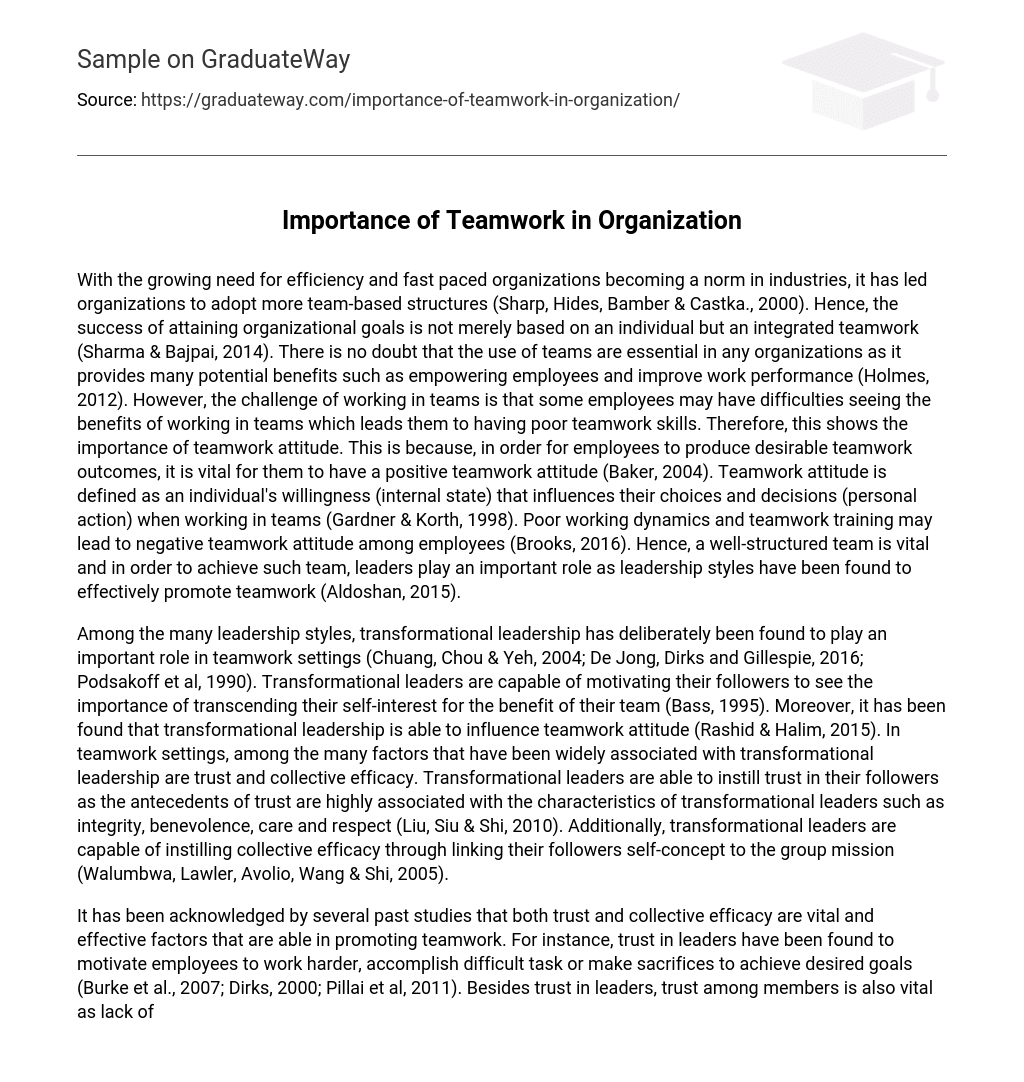With the growing need for efficiency and fast paced organizations becoming a norm in industries, it has led organizations to adopt more team-based structures (Sharp, Hides, Bamber & Castka., 2000). Hence, the success of attaining organizational goals is not merely based on an individual but an integrated teamwork (Sharma & Bajpai, 2014). There is no doubt that the use of teams are essential in any organizations as it provides many potential benefits such as empowering employees and improve work performance (Holmes, 2012). However, the challenge of working in teams is that some employees may have difficulties seeing the benefits of working in teams which leads them to having poor teamwork skills. Therefore, this shows the importance of teamwork attitude. This is because, in order for employees to produce desirable teamwork outcomes, it is vital for them to have a positive teamwork attitude (Baker, 2004). Teamwork attitude is defined as an individual’s willingness (internal state) that influences their choices and decisions (personal action) when working in teams (Gardner & Korth, 1998). Poor working dynamics and teamwork training may lead to negative teamwork attitude among employees (Brooks, 2016). Hence, a well-structured team is vital and in order to achieve such team, leaders play an important role as leadership styles have been found to effectively promote teamwork (Aldoshan, 2015).
Among the many leadership styles, transformational leadership has deliberately been found to play an important role in teamwork settings (Chuang, Chou & Yeh, 2004; De Jong, Dirks and Gillespie, 2016; Podsakoff et al, 1990). Transformational leaders are capable of motivating their followers to see the importance of transcending their self-interest for the benefit of their team (Bass, 1995). Moreover, it has been found that transformational leadership is able to influence teamwork attitude (Rashid & Halim, 2015). In teamwork settings, among the many factors that have been widely associated with transformational leadership are trust and collective efficacy. Transformational leaders are able to instill trust in their followers as the antecedents of trust are highly associated with the characteristics of transformational leaders such as integrity, benevolence, care and respect (Liu, Siu & Shi, 2010). Additionally, transformational leaders are capable of instilling collective efficacy through linking their followers self-concept to the group mission (Walumbwa, Lawler, Avolio, Wang & Shi, 2005).
It has been acknowledged by several past studies that both trust and collective efficacy are vital and effective factors that are able in promoting teamwork. For instance, trust in leaders have been found to motivate employees to work harder, accomplish difficult task or make sacrifices to achieve desired goals (Burke et al., 2007; Dirks, 2000; Pillai et al, 2011). Besides trust in leaders, trust among members is also vital as lack of trust in team will lead members to focus their effort and energy on defending their personal interest hence the failure of achieving team goals (De Jong, Dirks & Gillespie, 2016). Moreover, high collective efficacy in a team is also vital. This is because, when individuals believe that their members’ have the capability to perform a task successfully as a team, then they are more willing to sustain their efforts until they achieve the specific goal (Bandura, 1986). Consequently, it is evident that there is a vast amount of current literature establishing the influence of transformational leadership on trust and collective efficacy and the effectiveness of these factors in promoting teamwork. However, past studies have mainly focused the impact of these variables on group behavioral outcomes such as team performance. The current literature has not delved into investigating the influence of these variables on teamwork attitude. As attitude is a key determinant of behavior (Ajzen & Fishbein, 1997), a positive teamwork attitude can be viewed as an important antecedent that may lead to desirable teamwork behaviors.
Therefore, the present study intends to focus on teamwork attitude as an initial step of understanding teamwork in Malaysia. The present study intends to expand the current literature by investigating the impact of transformational leadership on trust and collective efficacy and how these factors may influence teamwork attitude among employees in Malaysia. As most leaders in Malaysian organizations tend to utilize transformational leadership style (Kamisan & King, 2013; Lo, Ramayah, Min & Songan, 2010), thus it is vital to examine the potential impact of this leadership style on trust, collective efficacy and teamwork attitude of employees in Malaysia. Several studies have found that Malaysians tend to prefer teamwork and have positive teamwork attitude when there is trust among team members. (Achim et al., 2015; Jayasingam, Ansari & Jantan 2010). However, the present study aims to investigate not only trust in members but also if trust in leaders is able to influence teamwork attitude as both trust in leaders and in members are important factors in promoting teamwork (Chuang et al., 2004). Additionally, as transformational leadership has been found to promote collective efficacy in teamwork settings, the present study also intends to investigate the impact of this factor on teamwork attitude. The influence of collective efficacy on teamwork attitude has not been widely researched upon. However, it has been stated that collective efficacy is a significant predictor for teamwork and is able to influence employee’s work attitudes (Bandura, 1986; Gully, Incalcaterra, Joshi & Beaubien., 2002), therefore it is possible that collective efficacy will promote a more positive teamwork attitude.
Overall, the present study intends to explore variables that can potentially affect teamwork attitude among employees. The findings of the present study can be useful to Malaysian organizations who plan to implement teamwork and requires further understanding of their future employees’ teamwork attitudes. In the following sections, we review past literature and present the hypotheses. Next, we elaborate on research methods, findings and lastly, we discuss on limitation, future researches as well as implications of the current study.





